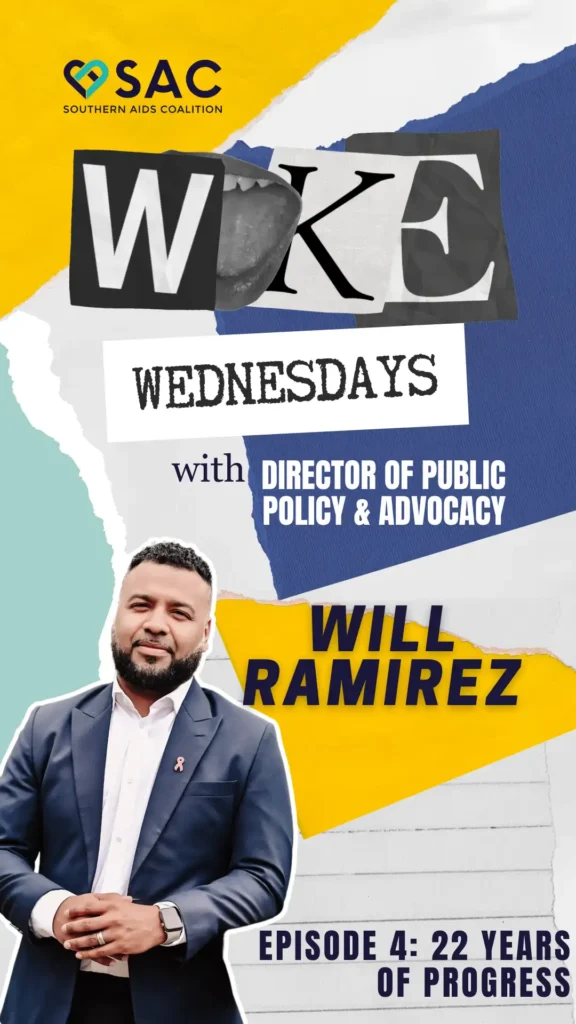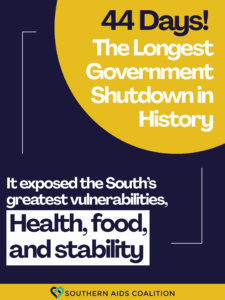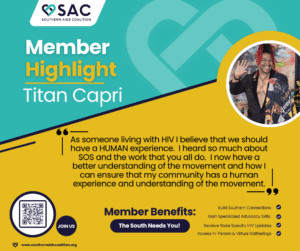By standing on the shoulders of past efforts and continuing to push forward, we can create a future where stigma no longer determines health outcomes.
In the Southern United States, 14 of the 16 states still have HIV-specific laws and/or sentence enhancements applicable to people living with HIV (PLHIV). Eleven of those states have prosecuted PLHIV under non-HIV specific general criminal laws. These criminalization laws are a prime example of how stigma functions as a social determinant of health, leading to worse health outcomes by discouraging people from seeking services like testing and treatment. As we mark the 22-year anniversary of the Southern States Manifesto, it is vital to reflect on the progress made and the ongoing challenges, particularly the pervasive impact of stigma. The Southern States Manifesto, over its 22-year history, has been a critical document in addressing the HIV epidemic, emphasizing the need for comprehensive strategies to combat stigma and improve health outcomes for a more just and equitable South.
The Southern States Manifesto traces its roots back to a pivotal moment in American history: the original Southern Manifesto of 1956. This document, signed by 101 Southern congressmen, vehemently opposed the Supreme Court’s decision in Brown v. Board of Education, which declared racial segregation in public schools unconstitutional. The 1956 Southern Manifesto epitomized the deep-seated resistance to racial equality and perpetuated systemic injustices that have had lasting impacts on the South, including in the realm of public health.
Stigma, as seen in the 1956 Southern Manifesto, has long been a tool to uphold systemic inequalities. The original manifesto not only fostered racial segregation but also entrenched a culture of discrimination that extended into healthcare, particularly affecting marginalized communities. This legacy of entrenched stigma and discrimination laid the groundwork for the public health crises that would follow, including the alarming rates of HIV in the South that the inaugural iteration of SAC’s Southern States Manifesto sought to address in 2002.
The first Southern States Manifesto emerged in a time of crisis. In 2002, the South faced alarming rates of HIV, compounded by limited healthcare access and deep-seated stigma, reminiscent of the segregationist attitudes of the 1956 Southern Manifesto. The 2002 manifesto sought to reclaim the title away from the 1956 segregationist’s version by calling for comprehensive strategies to address the growing disparities, emphasizing the need for community education and supportive policies, much like the collective advocacy efforts that countered the injustices of the 1950s and 60s.
The versions of SACs manifesto that followed in 2008 and 2012 built on this foundation, reflecting the evolving landscape of the epidemic. These documents highlighted the progress made, such as increased funding and improved health infrastructure, but also acknowledged that ongoing challenges persist. Throughout, the call to combat stigma remained a constant, underscoring its critical role in shaping health outcomes. This echoes the continued need for collective advocacy to dismantle systemic barriers, a fight that has been ongoing since the civil rights era.
By drawing a throughline from the original Southern Manifesto of 1956 to the SAC iterations, we see a consistent struggle against systemic oppression and stigma. SAC has over the past 20+ years, made significant strides in addressing these issues through its comprehensive and evolving manifesto and through its immersive engagement with communities and policymakers throughout the South. The historical perspective underscores the importance of advocacy and the ongoing fight against stigma and discrimination to achieve health equity in the South.
Stigma is defined by the CDC, as the denial of social acceptance to a person or group due to an attribute deemed discrediting by their community or society. Often this denial presents itself as devaluation and discrimination, which profoundly impacts health. In the context of HIV, stigma not only discourages people from seeking testing and treatment but also fuels discrimination and isolation.
The 2002 manifesto stressed the importance of community engagement and education to reduce stigma. By 2012, the manifesto called for more robust policy changes, highlighting the need for anti-stigma campaigns and supportive legislation. Despite these efforts, stigma remains a formidable barrier, particularly in the South, where cultural and socio-political factors often exacerbate discrimination.
SAC has been at the forefront of initiatives aimed at reducing stigma through both policy and community programs. Two standout initiatives are the LEAD Academy and the Younity Workshop. Both programs operate as stigma reduction interventions in which SAC partners with CBOs, but they differ in their approach. While the LEAD Academy seeks to combat HIV-related stigma by training people living with HIV to be leaders, educators, and advocates in their communities, Younity workshops look to infuse participants with the techniques and skills to overcome internalized HIV-related stigma. The impact of these initiatives is illustrated through the stories of those who have benefitted from them.
As we celebrate the 22nd anniversary of the Southern States Manifesto, we must renew our commitment to eradicating HIV-related stigma. This enduring barrier continues to undermine health outcomes and perpetuate disparities. By engaging in local initiatives, supporting comprehensive healthcare policies, and advocating for systemic change, we can rewrite the narrative.
This fight against stigma is far from over, but the progress made over the past 22 years gives us hope. By standing on the shoulders of past efforts and continuing to push forward, we can create a future where stigma no longer determines health outcomes. Join us in this vital work, and together, let’s create a more just, more equitable South.


